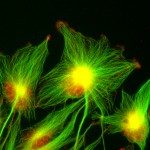Lien vers Pubmed [PMID] – 2554137
Mutat. Res. 1989 Nov;218(3):179-88
Genetic constructions in which the bacterial lacZ gene, encoding the enzyme beta-galactosidase, is fused to a viral (SV40) origin of replication have been introduced in an SV40-transformed hamster cell line (C1102). We have studied in detail 3 clones in which beta-galactosidase-specific activity increases after treatment with genotoxic agents. We show that this increase is dependent on the activity of the viral T protein and correlates with an amplification of lac sequences. This system provides a basis for the study of the induction of gene amplification by genotoxic agents in mammalian cells.

